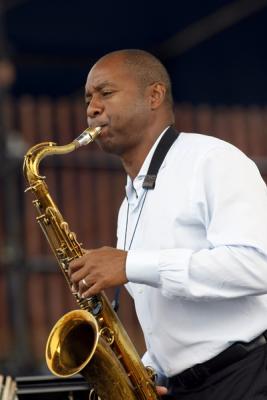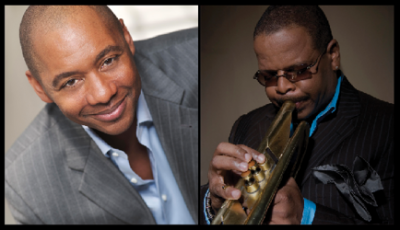Publication: Rifftides
Author: Doug Ramsey
Date: July 15, 2012
The Marsalis quartet achieves openness without abandoning harmonic guidelines, hipness without complex chord permutations. A saxophone soloist who manages to meld aggressiveness and wryness, Marsalis is at his peak here. The delight that he, pianist Joey Calderazzo, bassist Eric Reavis and young drummer Justin Faulkner find in supporting and surprising one another is likely to also affect the listener. The tunes are by members of the band except for Thelonious Monk’s “Teo” and Richard Whiting’s “My Ideal,” the latter with a tenor solo that combines tenderness and wit. A highlight: Marsalis’s “Treat it Gentle,” recalling Sidney Bechet’s passion on soprano, but not his wide vibrato. Read more »
Marsalis Music Radio
Join Our Mailing List
- RT @bmarsalis: Compliments of the @T_Blanchard archives. https://t.co/4RsXbyEloa — 2 years 36 weeks ago MarsalisMusic

 The Kennedy Center presented a double bill on Saturday evening that showed two very different approaches to modern acoustic jazz. Saxophonist Branford Marsalis and trumpeter Terence Blanchard are both titans of the genre, with strong pedigrees in the musical traditions of New Orleans. Marsalis’s quartet adopted a less structured sound that was more adventurous and challenging, while Blanchard’s quintet dug more into the swing of things and offered more accessibility during its half of the two-and-a-half hour concert.
The Kennedy Center presented a double bill on Saturday evening that showed two very different approaches to modern acoustic jazz. Saxophonist Branford Marsalis and trumpeter Terence Blanchard are both titans of the genre, with strong pedigrees in the musical traditions of New Orleans. Marsalis’s quartet adopted a less structured sound that was more adventurous and challenging, while Blanchard’s quintet dug more into the swing of things and offered more accessibility during its half of the two-and-a-half hour concert.